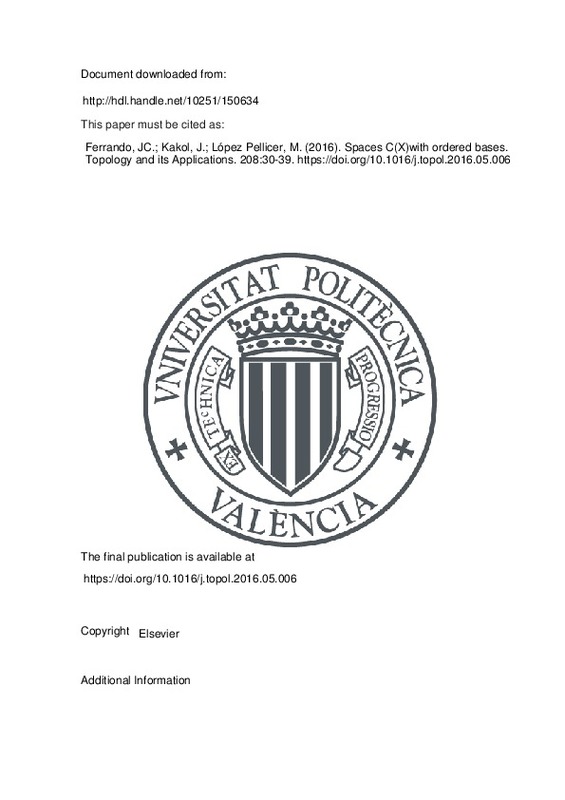JavaScript is disabled for your browser. Some features of this site may not work without it.
Buscar en RiuNet
Listar
Mi cuenta
Estadísticas
Ayuda RiuNet
Admin. UPV
Spaces C(X)with ordered bases
Mostrar el registro sencillo del ítem
Ficheros en el ítem
| dc.contributor.author | Ferrando, J. C.
|
es_ES |
| dc.contributor.author | Kakol, J.
|
es_ES |
| dc.contributor.author | López Pellicer, Manuel
|
es_ES |
| dc.date.accessioned | 2020-09-24T12:28:49Z | |
| dc.date.available | 2020-09-24T12:28:49Z | |
| dc.date.issued | 2016-08-01 | es_ES |
| dc.identifier.issn | 0166-8641 | es_ES |
| dc.identifier.uri | http://hdl.handle.net/10251/150634 | |
| dc.description.abstract | [EN] The concept of Sigma-base of neighborhoods of the identity of a topological group G is introduced. If the index set Sigma subset of N-N is unbounded and directed (and if additionally each subset of Sigma which is bounded in N-N has a bound at Sigma) a base {U-alpha : alpha is an element of Sigma} of neighborhoods of the identity of a topological group G with U-beta subset of U-alpha whenever alpha <= beta with alpha, beta is an element of Sigma is called a Sigma-base (a Sigma(2)-base). The case when Sigma = N-N has been noticed for topological vector spaces (under the name of G-base) at [2]. If X is a separable and metrizable space which is not Polish, the space C-c(X) has a Sigma-base but does not admit any G-base. A topological group which is Frechet-Urysohn is metrizable iff it has a Sigma(2)-base of the identity. Under an appropriate ZFC model the space C-c (omega(1)) has a Sigma(2)-base which is not a G-base. We also prove that (i) every compact set in a topological group with a Sigma(2)-base of neighborhoods of the identity is metrizable, (ii) a C-p (X) space has a Sigma(2)-base iff X is countable, and (iii) if a space C-c(X) has a Sigma(2)-base then X is a C-Suslin space, hence C-c(X)is angelic. (C) 2016 Elsevier B.V. All rights reserved. | es_ES |
| dc.description.sponsorship | Supported by Grant PROMETEO/2013/058 of the Conselleria de Education, Investigacion, Cultura y Deportes of Generalitat Valenciana. The second author also supported by the GACR Project 16-34860L and RVO: 67985840 | es_ES |
| dc.language | Inglés | es_ES |
| dc.publisher | Elsevier | es_ES |
| dc.relation.ispartof | Topology and its Applications | es_ES |
| dc.rights | Reserva de todos los derechos | es_ES |
| dc.subject | G-base | es_ES |
| dc.subject | C-Suslin space | es_ES |
| dc.subject | Web-compact space | es_ES |
| dc.subject | Strict angelicity | es_ES |
| dc.subject.classification | MATEMATICA APLICADA | es_ES |
| dc.title | Spaces C(X)with ordered bases | es_ES |
| dc.type | Artículo | es_ES |
| dc.identifier.doi | 10.1016/j.topol.2016.05.006 | es_ES |
| dc.relation.projectID | info:eu-repo/grantAgreement/GACR//16-34860L/ | es_ES |
| dc.relation.projectID | info:eu-repo/grantAgreement/GACR//67985840/ | es_ES |
| dc.relation.projectID | info:eu-repo/grantAgreement/GVA//PROMETEO%2F2013%2F058/ | es_ES |
| dc.rights.accessRights | Abierto | es_ES |
| dc.description.bibliographicCitation | Ferrando, JC.; Kakol, J.; López Pellicer, M. (2016). Spaces C(X)with ordered bases. Topology and its Applications. 208:30-39. https://doi.org/10.1016/j.topol.2016.05.006 | es_ES |
| dc.description.accrualMethod | S | es_ES |
| dc.relation.publisherversion | https://doi.org/10.1016/j.topol.2016.05.006 | es_ES |
| dc.description.upvformatpinicio | 30 | es_ES |
| dc.description.upvformatpfin | 39 | es_ES |
| dc.type.version | info:eu-repo/semantics/publishedVersion | es_ES |
| dc.description.volume | 208 | es_ES |
| dc.relation.pasarela | S\312496 | es_ES |
| dc.contributor.funder | Czech Science Foundation | es_ES |
| dc.contributor.funder | Generalitat Valenciana | es_ES |







![[Cerrado]](/themes/UPV/images/candado.png)

